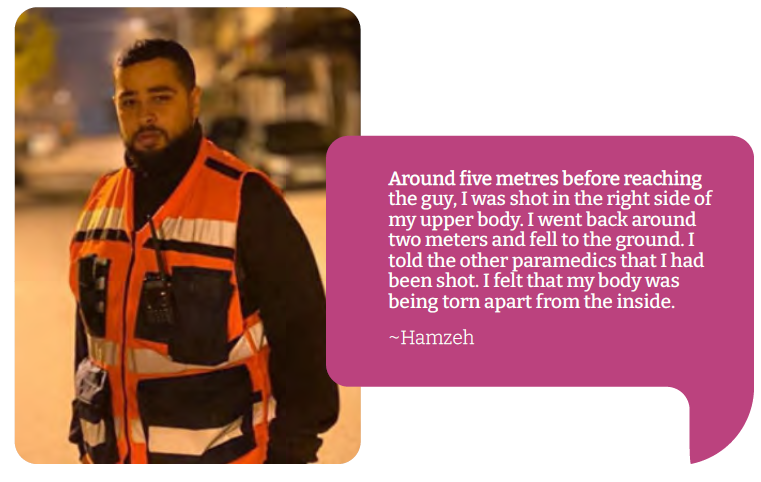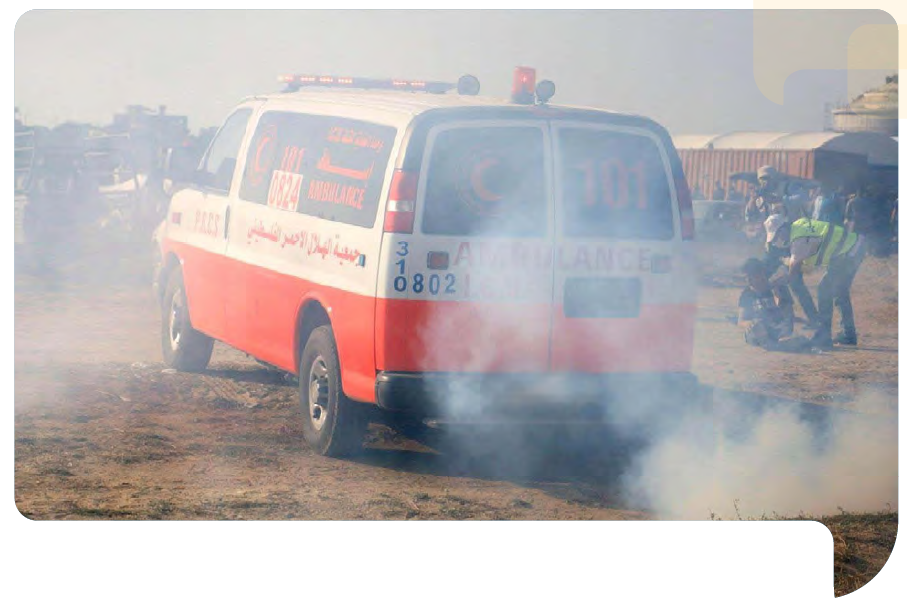27-year-old Hamzeh Abu Hajar is a volunteer paramedic with the Palestinian Medical Relief Society (PMRS).
In 2022, with increasing escalations across the West Bank, Hamzeh began volunteering as a PMRS first responder.
“Every time the Israeli forces would raid Nablus Old City, I would join the field team. PMRS cars would drive us to different locations where people were injured and needed our help. I always made sure to wear my vest before leaving the house, while PMRS made sure we were all wearing vests by the time we reached a location with injured people… At first, wearing the paramedic vests made us feel protected. However, as the confrontations increased the occupation forces stopped distinguishing between paramedics, journalists, and others. We all feel or show fear in different ways. Of course, I was scared when going into the field, but it wasn’t the kind of fear that would prevent me from going to help the people who depended on us.”
At around 8am on the morning of Friday 30 December, Israeli forces raided Nablus Old City. Hamzeh was called to the field to support treating the injured.
“I heard calls to help with an injury near my location. I immediately went to respond, and there were another two paramedics behind me. Around five metres before reaching the guy, I was shot in the right side of my upper body. I went back around two meters and fell to the ground. I told the other paramedics that I had been shot. I felt that my body was being torn apart from the inside. I was on the ground for several minutes until Al Razi ambulance [a private ambulance] reached me. A sniper had been shooting between the two ambulances on site and me.”
The second ambulance had been from the Palestine Red Crescent Society, which was obstructed from reaching Hamzeh. After Al Razi ambulance reached him, they transferred him to hospital. The ambulance tried to exit via the western route to Rafidia Government Hospital but was again obstructed by Israeli forces, which compelled the team to return and take a different route.
“I remember slipping in and out of consciousness. I vaguely remember being in the ambulance. I also remember my brother, doctors, some of my PMRS friends, and many other people surrounding me in the hospital. I was put in an emergency intensive care room when I reached the hospital and ten minutes later, I was transferred to the operating room.”
Hamzeh’s surgery took 4.5 hours. He stayed in the intensive care unit for 6 days, after which he was transferred to another ward for a further two days before being discharged home. The bullet had injured Hamzeh’s right lung and diaphragm, torn part of his liver and right kidney, and broken four of his ribs. He also suffered a bladder injury. After being shot, the bullet exited from his back, resulting in a tear of his muscle and an open wound around 20 to 25 centimetres in diameter. As a result of his surgery, Hamzeh had 40 stitches in his abdomen, while his back wound remains open and will require several months to heal.
Hamzeh is undergoing a slow recovery. He moves around the house and goes for follow up visits to the hospital every Tuesday. Because of his broken ribs he faces difficulties moving and sleeping. The injury of his lungs means he gets very tired whenever he tries to move around the house.
“Before my injury I witnessed some difficult cases working in the first response teams. I helped provide first aid to people who had very severe injuries. I even had to move people who had been killed. One of the hardest experiences was when I had to move a martyr who turned out to be my friend. I had been with him just a few hours before the raid. I was so shocked to see that it was my friend. Even these experiences didn’t prevent me from going back to the field. On the contrary, it gave me a stronger push to go and to support those in need, especially knowing that they depended on our help. I felt it was my duty to help them. After I fully recover, I plan to return. My mother is worried. She keeps telling me that she doesn’t want me to go back. She says the first time I was lucky, but we don’t know what will happen next time. Still, I plan to return.”



